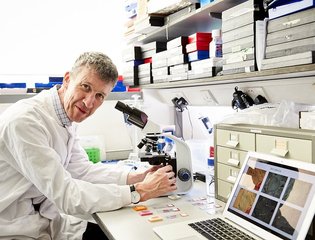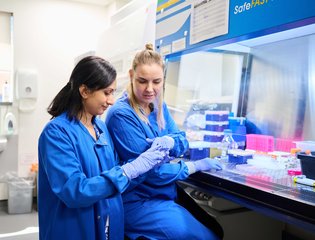How the BriTROC-2 trial will aim to help create new, personalised treatments for women with ovarian cancer
Every bit of research we fund has one clear objective above all else - that it will directly benefit women with ovarian cancer. Finding more effective treatments is one of the three key areas we believe will have maximum benefit for these women.
BriTROC-2 is a new Ovarian Cancer Action funded study that will help towards our goal of finding better treatments that will help women to live longer. However, as well as benefiting women in the future, this collaborative effort will have benefits for women living with ovarian cancer now.
Why is research into treatments crucial?
Ovarian cancer can be difficult to treat, especially as women are usually diagnosed at a later stage and there is a high chance of recurrence. Medical oncologist Dr Laura Tookman describes the questions we still need answers for, and how research can help to find them.
“I see many women everyday with ovarian cancer. I see women who have just been given their diagnosis, those whom I am delighted to explain that their cancer has responded to treatment and sadly I also see women who I have to explain that the cancer has returned or their cancer did not respond to the treatment.
All clinicians want to make sure that every woman gets the right treatment for them.
But in the majority of cases, we do not know why one woman may respond to treatment and their cancer never returns whereas another (with seemingly identical cancer) may not respond to treatment or their cancers grow very quickly after treatment. We want to know what treatment to give each individual who is sitting in front of us. We want to be able to tell each patient with ovarian cancer what will work for them and what will not.
We want to be able to answer these questions and research can help us to do this”.
How will the BrITROC-2 study help to answer these questions?
The study, coordinated by NHS Greater Glasgow and Clyde, aims to collect samples from 250 women with newly diagnosed ovarian cancer across 8 centres in the UK. The samples will be donated by women over the course of their treatment to help us understand how cancer cells change over time and why people respond differently to treatment.
Professor Iain McNeish at Imperial College London will be leading the laboratory research on these samples, following on from his team’s work in BriTROC-1. In the first study, his team found that High Grade Serous Ovarian Cancer (the most common type of ovarian cancer) can be broken down further to 7 subgroups. They found that each subgroup has its own prognosis and unique response to treatment. They now want to expand on this work to further understand why these subgroups develop resistance to treatment. The team will also be using the samples to grow and assess three dimensional mini-tumours in the lab called organoids. The organoids mimic ovarian tumours and will provide new information for finding more effective and successful treatments for patients.
The samples collected from this study will be available to other researchers, increasing the chance of groundbreaking discoveries that could benefit women affected by ovarian cancer.
What are the wider benefits of BriTROC-2 study for women affected by ovarian cancer now?
BriTROC-2 goes further than a typical research project as it is bringing together researchers and clinicians across the UK. Without this collaborative effort, researchers cannot collect enough samples and patient data to make important scientific discoveries. Connecting clinical centres could also help to improve care for ovarian cancer patients. For example, patients recruited into the trial will receive testing that is currently not widely available on the NHS which could immediately give them access to newly approved treatments.
We are excited to see how this study will support research into more effective treatments so more women with ovarian cancer survive and live longer.
If you would like to find out more about the BriTROC-2 study, please click here.


